|
The second South African Citizen’s Bribery Survey, conducted by The Ethics Institute and sponsored by Massmart, asked among other things whether respondents had ever said no to paying a bribe. The results show that half of respondents have never been asked for a bribe, while 60% of those who have been asked have declined to pay at some point – mostly for moral or religious reasons.
Other key findings include: • 1 in 5 people know someone who paid a bribe in the last year; • Over half of bribes are for road related matters (i.e. traffic fines + drivers’ licences). Reducing these could have an impact on road deaths; • The poor find it more difficult to get through everyday life without paying bribes than the wealthy, and are significantly more targeted to pay bribes for employment; and • Bribery for employment and contracts occur almost equally in the private and public sectors. These figures paint a picture of citizens that are familiar with the phenomenon of bribery, but the fact that so many people decline to pay bribes also show that there is hope. “As organisations across the country observe International Anti-corruption Day on 9 December, it is worth celebrating the ordinary heroes who choose to take a personal stand against corruption,” says Professor Deon Rossouw, CEO of The Ethics Institute. “The research findings show that South Africans do have a moral compass, and those who pay bribes are still in the minority.” According to survey respondents the top five reasons for resorting to bribery are to avoid traffic offences (36%); to secure a job (18%); to obtain a driver’s licence (15%); to receive unauthorised discounts from businesses (7%); and to get a tender 4%. Professor Rossouw says “It is clear that there are those who pay bribes to exploit the system for their own benefit, but there are also vulnerable people who are exploited by unscrupulous individuals. We found that South Africans with lower income find it significantly more difficult to get through everyday life without paying a bribe, particularly with respect to bribes to secure jobs. There is a certain injustice in the fact that those who have the least resources are most vulnerable to being targeted.” Massmart Anti-Corruption Compliance Executive, Johann Stander says “At Massmart we are committed to doing business the right way and have invested significantly in promoting a culture of integrity within our organisation. We also believe that we should play a broader anti-corruption role in our society because bribery increases the cost of living for all of us and undermines the rule of law and the values of our democracy. It is not good for social cohesion nor is it good for business, hence our sponsorship of the South African Citizens’ Bribery Survey.” The survey findings were based on interviews with more than 4553 South Africans from urban centres in Gauteng, Limpopo Kwazulu-Natal, Free State and the Western Cape. The objective of the survey is to gain insight into the everyday experience of ordinary South Africans in relation to their perceptions of bribery, the extent of bribery in the country as well as the socio-economic factors that influence it. Some of the questions asked included; “how frequently are people asked for bribes? What are these bribes for? How much do people pay for bribes? How willing are they to do something about bribery? What were the reasons for paying or refusing to pay a bribe?’’ About the South African Citizens’ Bribery Survey 2016 Conducted by The Ethics Institute and sponsored by Massmart, this is the first survey to examine bribery as perceived and experienced by ordinary South African citizens. It is the second year the survey is being conducted. The survey was conducted in a wide range of Massmart stores in Kwazulu-Natal, Gauteng, Free State, Western Cape and Limpopo. The 4553 South Africans who participated in the survey come from various income levels. ENDS MEDIA CONTACT: Cathlen Fourie, 082 222 9198, [email protected], www.atthatpoint.co.za For more information on The Ethics Institute please visit: Website: www.tei.org Twitter: @EthicsInst LinkedIn: The Ethics Institute Facebook: Ethics Institute of South Africa
0 Comments
By Professor Deon Rossouw, CEO, The Ethics Institute 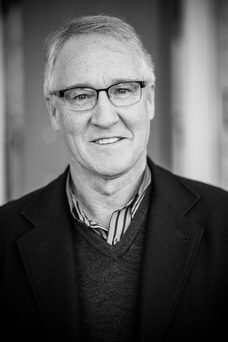 Professor Deon Rossouw, CEO, The Ethics Institute Professor Deon Rossouw, CEO, The Ethics Institute Social and Ethics Committees (SECs) are provided for in Section 72 (4-10) of the Companies Act, 2008 (Act No. 71 of 2008). But the uptake of these committees in companies is proving to be a challenge when, in fact, it should be seen as an opportunity for companies to build relationships with the communities and consumers they deal with daily. As some companies have discovered, having an SEC becomes more than a “check-box” exercise, and meaningful application has resulted in benefits in terms of strategy, risk management and turnover. SECs should be used to develop a more responsible culture of doing business in a sustainable manner. Perhaps the biggest achievement of having an SEC is that the issue of sustainability has become a regular agenda item at board meetings. Most SECs have settled into a rhythm of meeting prior to scheduled board meetings and their reports are tabled at subsequent board meetings. As a result, sustainability has become a regular subject for top-level discussion and scrutiny. As sustainability becomes part of the business-as-usual agenda, it becomes incorporated into companies’ operational DNA. Hence, the long-term impact of normalising social and ethical issues in businesses cannot be underestimated. Another related achievement is that because these issues are being thought about and reported on regularly, sustainability and integrated reports are becoming more credible and useful. Whereas previously, many of these reports were compiled in a hurry and did not necessarily reflect the truth, management now has to report regularly on these issues. So the content for these reports is generated by means of institutional processes and thus better reflects the truth. However, it should be noted that there remain a number of challenges. First, inexact and incomplete legislation and regulations continue to create confusion. Legally, the position is that SECs only have a social mandate. Leading companies have used King III as their guide and have incorporated ethics, but this is purely on a voluntary basis. This omission is something that legislators need to rectify soon. A structural challenge is the fact that the mandate of SECs can overlap with those of other board committees such as audit, HR and remuneration. This needs to be addressed to prevent “turf wars” from developing. A more difficult challenge is that most companies are still grappling with how to produce the right content and quality for SEC reports. Committee members tend to be nonexecutive, so do not have the inside knowledge to be able to assess the reporting, whereas managers are often uncertain about what needs to be reported on. A contributing factor is surely the lack of performance indicators for social and ethics issues, which makes it difficult for all parties to move beyond compliance and towards assessing the real impact of social and ethics performance. This expectation gap causes frustration. Based on The Ethics Institute’s interaction with hundreds of companies at various training sessions, our overwhelming conclusion is that the key factor of success is an SEC whose agenda is closely aligned with company strategy. This breathes energy into the committee’s operations because members can see the strategic importance of what they are doing, and the board and executive management can see that the company is deriving real value from the work done by the SEC. For example, as we have seen, a mine’s long-term sustainability is dependent on its relationship with the surrounding community and its employees, exactly the area for which the SEC takes responsibility. To paraphrase, don’t ask what you can do for your SEC, but what it can do for you. If the committee is seen to be delivering value, it will continue to improve and create a genuine virtuous cycle. This article first appeared in The Regulatory Debates Edition 3 ENDS MEDIA CONTACT: Cathlen Fourie, 082 222 9198, [email protected], www.atthatpoint.co.za For more information on The Ethics Institute please visit: Website: www.tei.org Twitter: @EthicsInst LinkedIn: The Ethics Institute Facebook: Ethics Institute of South Africa In welcoming the historic ruling by the Constitutional Court in the Nkandla matter, the Ethics Institute of South Africa (EthicsSA) says that the damage caused to the country will only be repaired if leaders admit they erred, and recommit themselves to the foundational values of the Constitution.
The Constitutional Court made it very clear in its ruling that South Africa’s constitutional democracy is founded on three core values – accountability, the rule of law and the supremacy of the Constitution, comments Prof Deon Rossouw, CEO of EthicsSA. “As the Chief Justice made very clear in a unanimous judgement by the Court, the President’s failure to uphold these values hinged on his breach of the ethics codes created to give substance to his constitutional obligations, the Executive Members’ Ethics Act and the Executive Ethics Code. The Nkandla scandal is primarily an ethical one, and it will require an ethical solution to resolve it fully.” The Executive Members’ Ethics Act and the Executive Ethics Code specifically require the executive to use its powers in the best interests of the public, and to avoid conflicts of interest. It explicitly calls on members of the Executive to not abuse their positions for private gain. In terms of the judgement, the President has been set time limits within which he must comply with the remedies stipulated by the Public Protector. However, argues Professor Rossouw, to prevent the shadow of Nkandla to continue falling across South African public life, it is essential for leaders to publicly recommit to the foundational values of the Constitution, and admit that they erred. “As we have seen in the cases of Vytjie Mentor and Mcebisi Jonas, bold action of this nature could cause an individual some short-term harm, but the long-term gains for our democracy, for the calibre of our public life and, I would predict, for the individuals concerned would be immense,” Rossouw says. “The credibility of both Parliament and the Executive has been dented by this affair, and this type of courageous ethical leadership will help to restore it. More important still, it will help to underscore the fact that ethics underpin how all of us, including our leaders, act.” “If the necessary ethical courage is not found, we can expect the saga of Nkandla to drag on, with grave consequences for the country.” ENDS MEDIA CONTACT: Cathlen Fourie, 082 222 9198, [email protected], www.atthatpoint.co.za For more information on EthicsSA please visit: Website: www.ethicssa.org LinkedIn: Ethics Institute of South Africa Facebook: Ethics Institute of South Africa 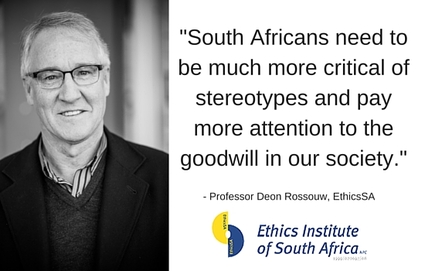 The current social media storm on racism demonstrates yet again how dangerous stereotypes are, and how easily they can become self-fulfilling prophecies. To prevent these inaccurate but powerful stories from setting the national agenda, South Africans must consciously tell a different story - backed up by the facts. “The reaction to recent racist tweets has shown the power of stereotypes to influence the way a whole nation sees itself, spreading negativity that affects not only individuals but the national mood itself. These tweets seem to confirm stereotypes so they spread easily, but they are simply not borne out by the facts,” says Professor Deon Rossouw, CEO of the Ethics Institute of South Africa (EthicsSA). “We need to be much more critical of these stereotypes and pay more attention to the goodwill in our society.” As an example of a stereotype related to corruption in South Africa, Professor Rossouw cites the findings in the recent survey into bribery conducted by EthicsSA and sponsored by Massmart. The survey found that while 78 percent of South Africans believe that bribery is necessary to get through everyday life, only 20 percent know somebody who has actually paid a bribe. In other words, even though the “received wisdom” is that bribery is both common and necessary, the vast majority of South Africans act differently. “Despite that finding, it was interesting that most of the headlines reporting on the survey incorrectly focused on the stereotype—‘Most South Africans pay bribes’—while the reality is that most do not,” says Professor Rossouw. “We need to discard inaccurate stereotypes consciously, or we risk feeding them and letting them become true.” Another example of how stereotyping masks, and can overpower, reality is evident in the racism debate currently underway, he continues. The spate of racist tweets and reactions to them can seem to confirm stereotypes that everybody is racist, thus creating the impression that reconciliation and nation-building have failed and are no longer worth pursuing. In fact, the opposite is true as the SA Reconciliation Barometer 2015 shows. Published late last year by The Institute for Justice and Reconciliation, the survey provides factual evidence that the vast majority of South Africans are committed to reconciliation and nation-building: 75.5 percent favour an inclusive South African identity, and 71 percent believe it is important to have a united South African nation. “This is astonishing given the fact that a majority (61.4 percent) also believe that race relations have stayed the same or worsened since democracy. So yes, the challenges remain daunting and not enough progress is being made, but the reality is that most of us want the South African project to succeed. You would never guess that from the dominant narrative in social (and other) media, though it’s apparent in work places and other places where people mingle,” Professor Rossouw argues. “We must tap into this reality, and use them to create a positive frame for the important national conversations that must take place. If we do not, we risk letting the stereotypes—the dangerous and inaccurate myths—dominate our reality. We must not let that happen.” ENDS MEDIA CONTACT: Cathlen Fourie, 082 222 9198, [email protected], www.atthatpoint.co.za For more information on EthicsSA please visit: Website: www.ethicssa.org LinkedIn: Ethics Institute of South Africa Facebook: Ethics Institute of South Africa  A recent survey of ordinary South Africans conducted by the Ethics Institute of South Africa (EthicsSA) and sponsored by Massmart-Walmart gives a fresh view on everyday bribery in the country. “What makes this research different is that we posed open questions, thus allowing people to report their actual experiences of bribery without being constrained by our imposed categories,” says Professor Deon Rossouw, CEO of EthicsSA. “Research like this is important because it moves us from the anecdotal to the concrete—and thus puts us in a better position to understand the challenge we face and, of course, to overcome it.” The research was conducted in Massmart stores in Gauteng, Durban, Cape Town and Polokwane. The 6 380 respondents were evenly split in terms of gender, with good representation across age and income groups. Twenty-six percent of respondents earned less than R100 000 a year. Some of the key findings include: • 26 percent of respondents knew of somebody who had been asked for a bribe in the past year. • 75 percent of those who were asked for a bribe ended up paying it. • Most bribes were reportedly asked to avoid traffic offences (36 percent) • Bribes for jobs came in next (17 percent), with unskilled and semi-skilled workers being most vulnerable to bribe requests in order to obtain jobs. • Bribes relating to tenders accounted for 7 percent of the responses. • 4 percent of bribes related to getting reduced prices or free goods from businesses. • The most common bribe amount was R100, with over half of all bribes (55 percent) falling under the R1 000 mark. Unsurprisingly, bribes amounts relating to tenders were the highest on average (R103 288), while the lowest average bribe amount was for traffic offences (R219). • Of the four provinces covered in the survey, one is most likely to be approached for a bribe in Limpopo (48 percent). Bribes are least likely to be solicited in the Western Cape (19 percent), followed by Gauteng (25 percent) and KwaZulu-Natal (26 percent). Professor Rossouw says that the findings show that bribery is equally prevalent in the private sector, despite the widespread view that it is primarily something that affects the public sector. “While we expected that bribery for contracts and jobs would be prevalent in the private sector, we were surprised by the extent to which private sector companies are being targeted for bribes to get discounts or free goods.” “While bribery is quite prevalent, we are not yet at the point where ‘everyone does it’” observes Professor Rossouw. “It is interesting to note that while 78 percent of respondents do not believe they can get through everyday life without paying a bribe, the fact is that only 20 percent of people know someone who has paid a bribe in the last year.” By far the majority of people believe that bribery will be frowned at by their family members and friends. At the same time 75% of people who were asked for a bribe paid it. “This is perhaps most worrying,” concludes Professor Rossouw. “Virtually everybody agrees that not enough is being done to combat bribery in the country, but perhaps we should be talking more about people’s individual responsibility not to participate in bribery.” ENDS MEDIA CONTACT: Juanita Vorster, 079 523 8374, [email protected], www.atthatpoint.co.za For more information on EthicsSA please visit: Website: www.ethicssa.org LinkedIn: Ethics Institute of South Africa Facebook: Ethics Institute of South Africa Being too ethical, human nature, and transforming ethics risks into change opportunities are three major challenges in reducing fraud and corruption. These challenges were highlighted at the recent 8th annual Ethics Officer Learning Forum.
The event was hosted by the Ethics Institute of South Africa (EthicsSA); currently the only organisation in South Africa that train Certified Ethics Officers. Since 2004 a total of 1093 delegates have completed theoretical training, with 498 completing the practical component that is required to become a Certified Ethics Officer. “Ethics officers are charged with the planning and execution of activities that reduce fraud and corruption, but that also build an ethical organizational culture,” said Prof Deon Rossouw, CEO of EthicsSA. “The purpose of the annual Ethics Officer Learning Forum is to bring Ethics Managers together to learn from one another.” Leaders can be too ethical “The ethical leader is not a moral saint to be feared and excluded by others,” said Tom Beale, a consultant in the field of governance, ethics and compliance. “A good ethical leader is someone that is genuinely concerned with finding a sound balance between the interests of the self and others. This will usually be evident in their strive for creating a workplace that is both ethical and enjoyable.” Beale advises against leaving ethical conduct up to complying with laws, procedures and guidelines like the King Code of Governance. A more effective approach is to use ongoing training to entrench ethical habits and behaviours, after which compliance to rules and regulations will usually follow. Plan for human nature to derail ethical intentions “The purest ethical intentions supported by the best ethics training will be challenged by our human nature,” said Paul Vorster from JVR & Associates. Ethical conduct means different things to different people, and when faced with ethical dilemmas people will act based on their own morals and values. Employers assuming that the morals and values of employees align with the ethical goals of the company face huge ethics risks. Convert ethics risks into opportunities for change An ethics risk is a situation that could force those involved to have to choose between acting ethically and getting a job done in an unethical manner. With relevant training, employees will know how to confidently act in the best interests of the greater good, themselves or the organisation they represent. “Risk contains both danger and opportunity,” said Lea Annandale-Dippenaar, an ethics and enterprise risk management advisor. “Ethics risks hold opportunities for organisations to develop, grow and teach their employees to develop finer skills in managing and reducing ethics risks.” ENDS MEDIA CONTACT: Juanita Vorster, 079 523 8374, [email protected], www.atthatpoint.co.za For more information on EthicsSA please visit: Website: www.ethicssa.org LinkedIn: Ethics Institute of South Africa Facebook: Ethics Institute of South Africa Certified Ethics Officers can prevent further increase in unethical conduct“Talking about fraud and corruption isn’t going to prevent it from happening,” says Professor Deon Rossouw, CEO of the Ethics Institute of South Africa (EthicsSA). “We need to train people in preventing unethical conduct.”
Certified Ethics Officers are qualified to develop codes of ethics and to assist organisations in ensuring that all their stakeholders are familiar with, and adhere to their codes of ethics. “An ethics officer acts as a signal that an organisation is serious about maintaining a high ethical standard,” says Rossouw. “He or she can help to prevent fraud, corruption and other malpractices from occurring by actively managing corporate ethics and building an ethical culture.” Ethical conduct revolves around actions that balance self-interests, the interests of others, and the greater good. “Navigating tricky ethical issues is something that requires professional expertise—common sense on its own is no longer a reliable guide,” warns Rossouw. “Training and certification are absolutely essential to ensure that an ethics officer is empowered and can deliver the maximum business value.” “Qualified ethics officers will know how to act as helpline for employees on all ethical issues,” says Rossouw. “With appropriate training, they can also analyse an organisation’s whistle-blowing data to look for trends and implement preventative measures against unethical conduct.” EthicsSA is currently the only organisation that offers certified Ethics Officer training in South Africa and in Africa. A list of Certified Ethics Officers is available from http://bit.ly/ethics-officers ENDS MEDIA CONTACT: Juanita Vorster, 079 523 8374, [email protected], www.atthatpoint.co.za For more information on EthicsSA please visit: Website: www.ethicssa.org LinkedIn: Ethics Institute of South Africa Facebook: Ethics Institute of South Africa 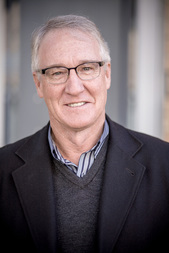 Professor Deon Rossouw says there are important lessons that can be learned from Nkandlagate. Professor Deon Rossouw says there are important lessons that can be learned from Nkandlagate. As allegations of fraud and corruption rise, both public and private sector organisations need to know how to act when accused of unethical conduct. Important lessons on how to handle a scandal can be learned from Nkandlagate. “The Nkandla issue was always a moral one, not a legal one, as the Public Protector’s report makes clear,” says Professor Deon Rossouw, CEO of the Ethics Institute of South Africa (EthicsSA). “The Public Protector’s finding was that the President breached the Executive Ethics Code, not that a law was broken. The government’s general approach, however, was to attempt to focus on the legality of what had been done.” Act quickly, and separate the legal from the ethical Allegations of both illegal and unethical conduct should be dealt with quickly. The alleged individual or organisation should without delay admit the moral responsibility or provide a reason for not taking moral responsibility. When faced with tricky moral issues, many seem to adopt delaying tactics in the hope that the issues will disappear. In fact, as we have seen with Nkandlagate, avoidance actually serves to heighten suspicion and fuels speculation. Those accused should distance themselves from any investigations It is absolutely vital that the person(s) accused of wrong-doing ensure that there is no perceived interference in the investigation process. “This principle was clearly not followed during Nkandlagate, where those investigating were members of the government or the leading party,” says Professor Rossouw. “If further investigations were required, President Zuma could have removed himself from a difficult position by appointing a trusted third party to investigate.” He adds that President Zuma’s involvement was initially forced on him by the shortcomings of the Executive Members’ Ethics Act. The Act requires that the Public Protector’s report is submitted to the President, with no provision made for the procedure when the President is the subject of the report. “The necessary amendment to fix this problem in the Act has been gathering dust since 2011, and we see the consequences before us,” he says. “Facing the moral issue head on would have offered the President and government a resolution with far less reputational damage,” Professor Rossouw believes. “We should not forget that Nixon’s fall was primarily linked to his involvement in the investigation and cover-up of Watergate, not the original act.” ENDS MEDIA CONTACT: Juanita Vorster, 079 523 8374, [email protected], www.atthatpoint.co.za For more information on EthicsSA please visit: Website: www.ethicssa.org LinkedIn: Ethics Institute of South Africa Facebook: Ethics Institute of South Africa In the wake of the first hike in personal income tax for 20 years the willingness of citizens to pay tax will be an indication of the strength of the social contract—the mutually beneficial agreement that commits government and citizens to work together to maintain a sustainable community.
“Tax morale—the willingness of citizens to pay their taxes—has sunk to new levels prompted by the small increase in personal tax plus an increase in other taxes such as the Road Accident Fund levy on the fuel price. The high levels of citizen unhappiness, and talk of a tax revolt, are an indication that our social contract is under strain,” says Professor Deon Rossouw, CEO of the Ethics Institute of South Africa (EthicsSA). “Government and citizens are both parties in this social contract, and both need to take decisive action to repair it.” The preface to a working paper on tax morale in developing countries for the Organisation of Economic Co-operation and Development (OECD), states “…at a deeper level, taxation and fiscal policy are at the core of every society’s social contract. Citizens pay their taxes in exchange for public services and goods”. The OECD goes on to make the critical point that this exchange legitimates the political dispensation and the state itself.* For the social contract to work, both parties have to honour their commitments. At present, though, citizens are beginning to question whether it is just to suffer additional taxes when the state is not fulfilling its part of the bargain. High levels of corruption, and fruitless and wasteful expenditure, coupled with sub-optimal service delivery are all prompting taxpayers to question the moral foundation of additional taxes. The perceived failure of the state to honour its obligations to taxpayers is worsened by the growing belief that the integrity of SARS, the tax-collection agency, has been compromised. Once seen as the cleanest and most effective organ of state, SARS is currently plagued by controversy—so much so that the Finance Minister has had to appoint an advisory committee to investigate. More worrying over the long term, though, are growing reports that SARS is becoming less even-handed in its treatment of taxpayers, and that individuals with powerful connections merit a different approach from SARS. Professor Rossouw points out that tax collection has to be seen to be fair, transparent and predictable in order to protect tax morale. This is particularly important given the far-ranging powers conferred on SARS to collect taxes it deems are owed. SARS officials find themselves in a position where they can be tempted to use their position to enrich themselves, thus making it imperative that the organisation ensure that its internal ethics is managed effectively. “Taxpayers who avoid paying their taxes are indeed guilty of putting the social contract at risk, and they should think carefully about doing the right thing. But, equally important, the state has to put its own house in order avoid tax revolt by citizens, and thus a breakdown of the social contract,” Professor Rossouw concludes. * Christian Daude, Hamlet Gutiérrez and Ángel Melguizo, “What drives tax morale?”, Working paper No. 315, OECD, available at http://www.oecd.org/dev/americas/WP315%20AE.pdf. ENDS MEDIA CONTACT: Juanita Vorster, 079 523 8374, [email protected], www.atthatpoint.co.za For more information on EthicsSA please visit: Website: www.ethicssa.org LinkedIn: Ethics Institute of South Africa Facebook: Ethics Institute of South Africa 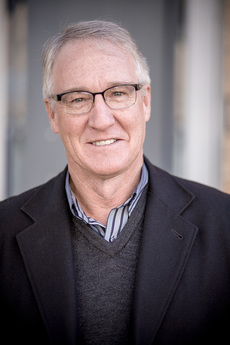 Professor Deon Rossouw says ethical behaviour cannot be legislated: we all have to make it habitual or we will find ourselves in a race to the bottom Professor Deon Rossouw says ethical behaviour cannot be legislated: we all have to make it habitual or we will find ourselves in a race to the bottom * NOTE: Supporting video, audio and image available at http://bit.ly/1AXOiFk The year is barely a month old and already we have ample evidence of how easily societies can fracture. The escalating violence in West Africa perpetrated by Boko Haram, the massacre at the Charlie Hebdo offices in France and, thankfully less dramatically, the Twitter storm that broke after President Zuma’s remarks in Cape Town, and Zelda la Grange’s tweets from London—all these incidents graphically illustrate how different beliefs and opinions can pull nations apart. “We all want to live in countries that are safe and prosperous, and destructive conflicts makes that an impossibility,” says Deon Rossouw, CEO of the Ethics Institute of South Africa (EthicsSA). “Nations, and particularly nations like South Africa, with its history of division, need a strong moral glue to hold them together. Unfortunately, ethical behaviour cannot be legislated: we all have to make it habitual or we will find ourselves in a race to the bottom.” Rossouw argues that if we cultivate the following three ethical habits (or virtues), we will each be playing a role in creating a safer and more decent society. Moral sensitivity Moral sensitivity means considering how what we say or do affects others in the community. “It’s about transcending narrow, short-term interests to consider how our words or actions affect others,” he says. “The misuse of social media for instance is a concern because people use it in the heat of the moment, forgetting to put themselves in the other person’s shoes—we remain trapped in the business of scoring debating points and end up painting each other into corners.” Moral imagination Moral sensitivity should be complemented by cultivating the ability to look beyond the moment at what might be—the “big picture” so beloved of business strategists. “Moral imagination is the ability to look beyond existing divides and see the potential that can unfold if we approach matters differently”, he said. Take the Twitter storm that erupted after the President’s remarks linking Eskom’s current woes to apartheid, and that the arrival of Jan van Riebeeck spelled trouble for the Cape. The reactions were largely all too predictable, but what if they had focused more on the kind of society we want to create? After all, the President basically condemned himself by what he said, but the heated responses kept the debate at the same level, by and large. “People tend to fight instinctively for their position without realising the long-term damage they are doing to society,” Rossouw comments. “We have to learn how to lament what we see as current shortfalls in such a way as to bring forth the future we want.” Moral courage Quite simply, most people have the intention to act morally or ethically, but they also need to act on their moral intentions, even when doing so would be inconvenient or not self-serving. If we see corruption occurring, we have to put aside feelings of loyalty or expediency and report it; and if we are caught out, we should not take the easy way out by offering a bribe. Deon Rossouw emphasises that it would be a mistake to think that integrating these ethical habits into the way we live our lives is unattainable. “Nelson Mandela was a shining example of somebody who had moral sensitivity, moral imagination and considerable moral courage,” he explains. “He was able to think himself into the minds of his opponents, he never allowed a current issue to make him lose sight of the South Africa he wanted ultimately to create, and he acted on these insights even though it may have cost him some support. We need to follow his lead.” ENDS MEDIA CONTACT: Juanita Vorster, 079 523 8374, [email protected], www.atthatpoint.co.za For more information on EthicsSA please visit: Website: www.ethicssa.org LinkedIn: Ethics Institute of South Africa Facebook: Ethics Institute of South Africa |
Welcome to the newsroom of The Ethics Institute. For media releases prior to August 2014 please click here.
Archives
August 2017
Categories
All
|

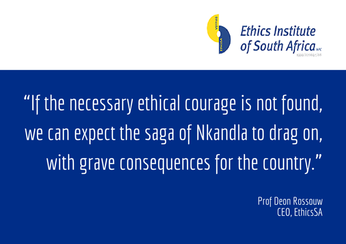
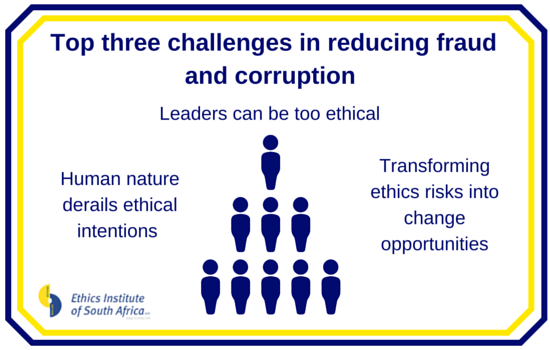
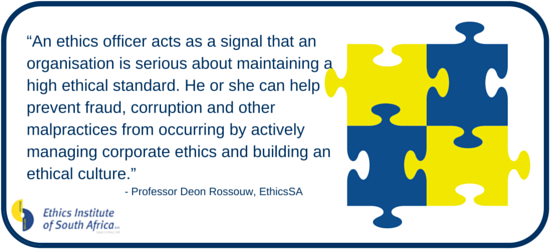
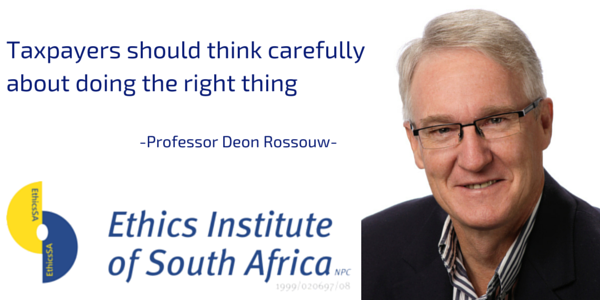
 RSS Feed
RSS Feed